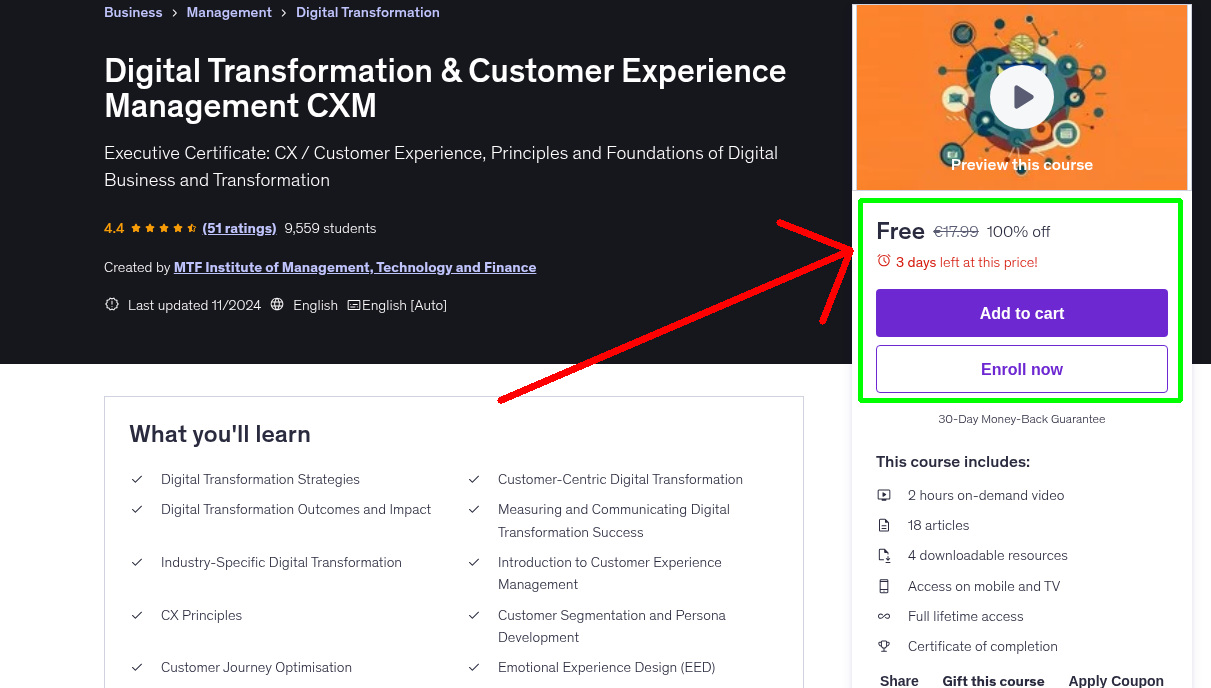
What You'll Learn
- Digital Transformation Strategies
- Customer-Centric Digital Transformation
- Digital Transformation Outcomes and Impact
- Measuring and Communicating Digital Transformation Success
- Industry-Specific Digital Transformation
- Introduction to Customer Experience Management
- CX Principles
- Customer Segmentation and Persona Development
- Customer Journey Optimisation
- Emotional Experience Design (EED)
Requirements
- For a better learning experience, we suggest you to use a laptop / mobile phone / pen and paper for taking notes, highlighting important points, and making summaries to reinforce your learning.
Who This Course is For
- No special requirements. A course for anyone who wants to build career in business
- Customer experience (CX) is the overall impression customers have of your brand throughout their interactions with your business. It encompasses everything from the initial marketing message to the post-purchase support they receive. Think of it as the customer journey, and CX is all the touchpoints along the way that shape their perception. Key Areas of CX Customer touchpoints: Every interaction a customer has with your brand, like websites, social media, advertising, in-store experience, and customer service. Customer journey: Mapping out the steps a customer takes to interact with your brand, from awareness to purchase and beyond. Customer satisfaction: How happy customers are with your product or service. Customer loyalty: How likely customers are to return and recommend your brand to others. CX Frameworks Frameworks provide a structured approach to improving CX. Here are two common ones: Customer Experience Journey Map: A visual representation of the customer journey, identifying touchpoints and opportunities for improvement. Five Service Dimensions: A framework that focuses on five key aspects of service quality: reliability, responsiveness, assurance, empathy, and tangibles.
- Why Learning CXM is Important for Companies: Improved Customer Satisfaction and Loyalty: CXM focuses on understanding and meeting customer needs, leading to increased satisfaction and a higher likelihood of repeat business. Enhanced Brand Reputation: Positive customer experiences contribute to a strong brand reputation, attracting new customers and retaining existing ones. Increased Revenue and Profitability: Satisfied customers are more likely to spend more, refer others, and remain loyal, all of which contribute to revenue growth. Competitive Advantage: In today's crowded marketplace, exceptional customer experience can be a key differentiator, setting a company apart from its competitors. Reduced Costs: Resolving customer issues proactively and efficiently can reduce the cost of customer service and support.
- Why Learning CXM is Important for Building a Career as a Manager: In-demand Skill: CXM is a highly sought-after skill in today's business world, as companies increasingly recognize its importance. Career Advancement: Expertise in CXM can open doors to various managerial roles, such as Customer Experience Manager, Customer Success Manager, or Marketing Manager. Problem-solving Skills: CXM involves identifying and addressing customer pain points, which enhances problem-solving and analytical skills. Leadership Development: Managing customer experience initiatives requires strong leadership, communication, and collaboration skills. Cross-functional Collaboration: CXM often involves working with multiple departments, providing managers with exposure to different areas of the business.
- Importance of Education in Digital Transformation for Companies and Managers: In the business environment, digital transformation has emerged as a key driver of competitive advantage and long-term success. Embracing digital technologies is no longer an option but a necessity for companies to remain relevant and thrive. However, implementing digital transformation initiatives requires more than just adopting new tools; it demands a comprehensive understanding of digital trends, customer behavior, data analytics, and organizational change management. This education helps companies and managers: Strategic Adaptation: Digital transformation education empowers organizations to align their strategies with the opportunities and challenges presented by the digital age. It helps leaders identify potential areas for disruption and develop agile responses to stay ahead of the competition. Enhanced Customer Experience: Understanding digital transformation enables businesses to design and deliver exceptional customer experiences, which are crucial for customer retention and loyalty in today's customer-centric market. Data-Driven Decision Making: The course equips managers with skills in data analysis and interpretation, enabling them to make data-driven decisions that lead to improved business outcomes. Innovation and Creativity: Participants will learn about emerging technologies and innovation processes, fostering a culture of creativity within their organizations and driving continuous improvement. Organizational Resilience: With digital transformation education, managers can build resilient organizations capable of adapting to disruptions and thriving in times of uncertainty.
Your Instructor
MTF Institute of Management, Technology and Finance
Institute of Management, Technology and Finance
4.4 Instructor Rating
101,513 Reviews
969,954 Students
274 Courses
Never Miss a Coupon!
Subscribe to our newsletter to get daily updates on the latest free courses.



